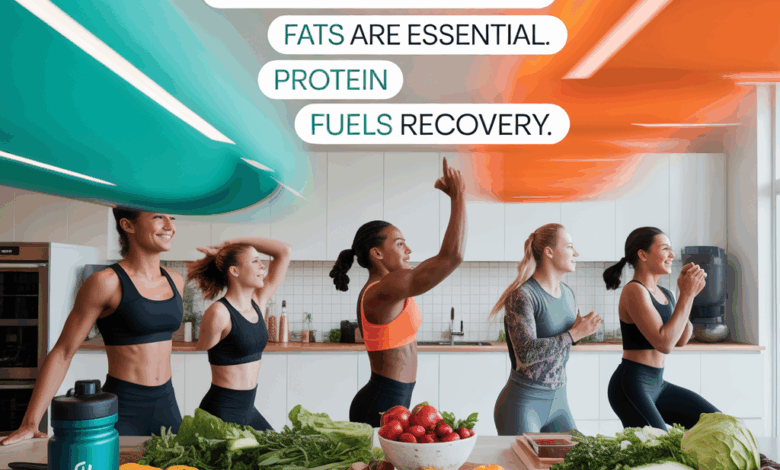Common Misconceptions About Nutrition: Busting Diet Myths with Real Science

Ever found yourself staring at a glowing smoothie bowl on Instagram and wondering if that influencer’s “miracle breakfast” is the secret to weight loss? Or have you ever avoided carbs after 6 p.m. because a friend swore it’s the only way to lose belly fat? You’re not alone. We live in an age of fast nutrition advice, and many common misconceptions about nutrition are steering people away from sustainable, evidence-based habits.
Why nutrition myths spread so easily
Quick tips, sensational headlines, and zero-context before-and-after photos travel faster than nuanced science. Simplified rules (“never eat carbs,” “skip breakfast”) are easy to follow, but they often ignore factors like activity level, total calorie balance, food quality, and personal preferences. The result? Confusion, yo-yo dieting, and frustration.
Top common misconceptions about nutrition (and the real science)
Myth 1 — Carbs make you gain weight
Reality: Carbohydrates are not villains. Excess calories—regardless of whether they come from carbs, fats, or proteins—lead to weight gain. Carbs fuel high-intensity workouts and brain function. Choose whole grains, fruits, and vegetables for fiber and slow energy release.
Practical tip: Swap white bread for whole-grain options and pair carbs with protein or healthy fat to stabilize blood sugar during meals.
Myth 2 — Eating fat makes you fat
Reality: Dietary fat is calorie-dense but essential for hormone production, nutrient absorption, and satiety. Healthy fats (avocado, nuts, olive oil) support a balanced diet. The issue is overconsumption of refined, processed fats or excessive portion sizes.
Fitness variation: Add a tablespoon of olive oil to roasted veggies or a small handful of almonds to your pre-workout snack for sustained energy.
Myth 3 — Low-fat or fat-free is always healthier
Reality: Low-fat versions of foods often contain added sugar, thickeners, and artificial ingredients to replace flavor and texture. Whole foods with natural fats are usually more satisfying and less processed.
Myth 4 — You must detox or cleanse regularly
Reality: The body has a sophisticated detox system (liver, kidneys, lungs, skin). Short-term cleanses can cause electrolyte imbalances and rebound overeating. Focus on consistent hydration, fiber, and nutrient-dense foods to support natural detox pathways.
Myth 5 — Supplements can replace real food
Reality: Supplements like multivitamins or protein powders can complement a diet, but they aren’t substitutes for the diverse nutrients, fiber, and phytonutrients in whole foods.
Real-world example: Instead of relying solely on a meal replacement shake, combine a protein shake with a banana and nut butter after a hard training session for carbs, protein, and healthy fats.
Myth 6 — Eating late at night causes belly fat
Reality: The total calories and macronutrient balance over the day matter more than timing. Late-night meals can be part of a healthy routine if portions are reasonable and overall daily intake matches your goals.
Myth 7 — Calories are the only thing that matters
Reality: Quality matters. Two 300-calorie meals can affect hunger, energy, and performance differently depending on macros and micronutrients. Prioritize nutrient-dense choices to support health and fitness.
Practical nutrition and fitness tips for real life
- Meal prep for consistency: Batch-cook proteins, grains, and roasted vegetables for quick, balanced meals during busy weeks.
- Combine strength training with cardiovascular exercise: A weekly mix of resistance sessions (2–3x) and moderate cardio (2–3x) supports fat loss, muscle retention, and metabolic health. See sample workout routines.
- Pre- and post-workout fueling: Aim for 20–40g of carbs and 15–30g of protein after intense workouts to support recovery. For shorter sessions, a banana or yogurt may be enough.
- Practice portion control, not deprivation: Use your plate as a guide—half vegetables, a quarter lean protein, a quarter whole grains or starchy vegetables.
- Prioritize sleep and stress management: Poor sleep increases hunger hormones and undermines food choices. Incorporate short walks, breathing exercises, or a 10-minute mobility routine to reduce stress.
- Experiment and personalize: Keep a food-log for two weeks to identify patterns in energy, sleep, digestion, and workout performance.
Workout variations to support nutrition goals
- Fat loss focus: Circuit training (45–60 minutes) with compound lifts and brief cardio intervals.
- Muscle gain focus: Progressive overload with 3–5 sets per main lift, 6–12 reps, and intentional calorie surplus from whole foods.
- Performance focus: Sport-specific conditioning, carbohydrate-timed meals, and targeted protein intake for recovery.
Need a deeper dive into macronutrient balance, portion sizing, or meal plans? Check our nutrition guides for practical templates and examples.
How to separate nutrition fact from fiction
- Look for quality sources: Prefer peer-reviewed studies, registered dietitians, and established health organizations over trendy social posts.
- Ask critical questions: Who benefits? Is the claim backed by evidence or a single testimonial?
- Test changes slowly: Implement one adjustment for 2–4 weeks and monitor energy, performance, mood, and body composition before declaring success or failure.
- Work with a pro when needed: A registered dietitian or certified sports nutritionist can personalize plans for weight loss, muscle gain, or metabolic concerns.
Frequently Asked Questions
A: Carbohydrates can be part of a weight-loss plan. They provide energy for workouts and daily activity. The key is total calorie balance, food quality, and matching carb intake to your activity level.
A: Most people can meet nutritional needs through a varied diet. Supplements can help fill gaps (like vitamin D in low-sun regions or iron for those with deficiencies) but aren’t a replacement for whole foods.
A: Intermittent fasting works for some people and not for others. Its benefits often come from simplifying calorie control and meal timing. Choose an eating pattern you can sustain long term that supports energy, sleep, and training.
Conclusion — Rethink the noise: common misconceptions about nutrition and what to do next
Nutrition doesn’t have to be confusing. By recognizing common misconceptions about nutrition, focusing on whole foods, balancing macronutrients, and pairing smart eating with consistent movement, you build a sustainable path to better health. Start small: swap a processed snack for a whole-food alternative this week, try one new workout from our workout routines, or read a short guide from our nutrition guides to plan your meals. Want help crafting a personalized approach? Try tracking your meals for two weeks and reach out to a nutrition professional or use our wellness resources to get tailored support.





